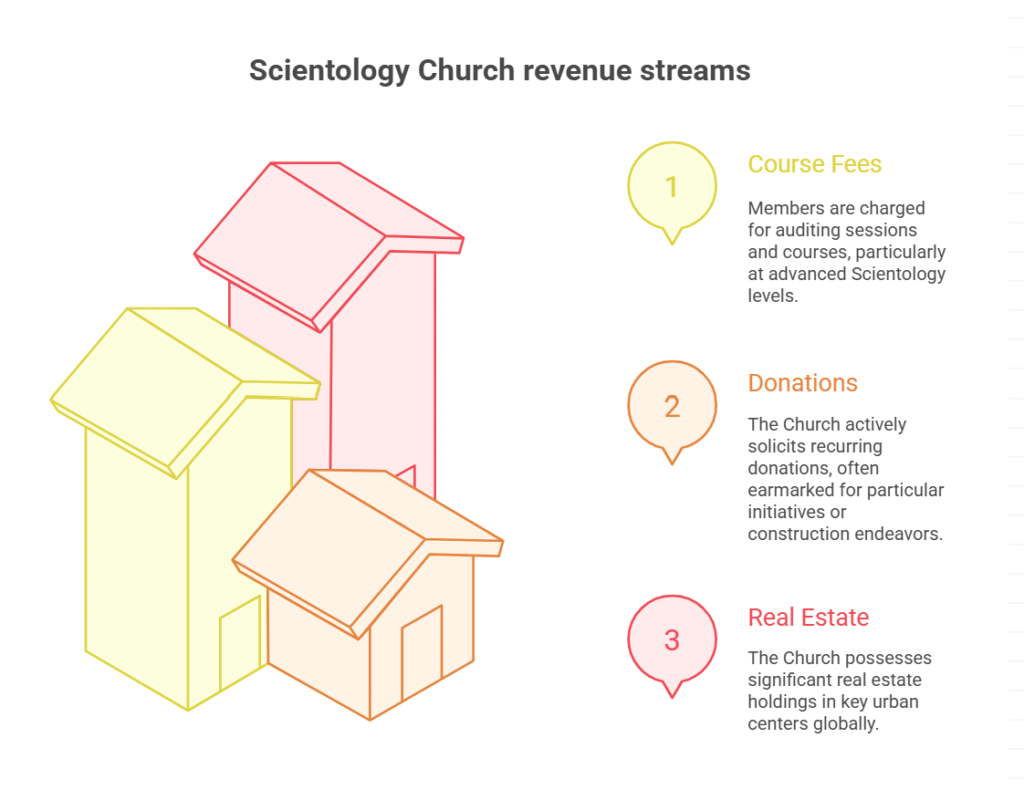What is a Scientologist and why this term sparks so much curiosity—and sometimes controversy? If you’ve ever scrolled through social media or caught a headline about the Church of Scientology, you’ve probably asked yourself, “What do Scientologists actually believe? Why is Scientology hated by some, yet fiercely defended by others?” You’re not alone. The world of Scientology is shrouded in mystery, rumors, and passionate opinions. Today, we’re pulling back the curtain to give you a clear, unbiased look at what it really means to be a Scientologist in 2025.
Understanding the Basics: What Is a Scientologist?
At its core, a Scientologist is someone who practices or supports the teachings of Scientology—a religion founded in the 1950s by science fiction writer L. Ron Hubbard. But that’s just the surface. Scientologists see themselves as seekers of spiritual freedom, using a unique set of beliefs and practices to improve their lives and the world around them.
So, what is a Scientologist in practical terms? It’s someone who follows the principles laid out in Hubbard’s book Dianetics: The Modern Science of Mental Health and participates in the Church of Scientology’s courses, counseling sessions (called “auditing”), and community activities. Some are lifelong members, while others join out of curiosity or in search of personal growth.
But what draws people in—and what keeps them there? Let’s dig deeper.
The Core Beliefs of Scientology: What Do Scientologists Actually Believe?
Scientology isn’t your typical religion. Instead of focusing on worship or prayer, it centers on self-improvement, mental clarity, and spiritual advancement. Here are some of the key beliefs:
- The Thetan: Scientologists believe each person is a spiritual being called a “thetan,” separate from the body and mind. The thetan is considered immortal and has lived through many past lives.
- Personal Growth: The goal is to achieve a state called “Clear,” where a person is free from the negative effects of past traumas (called “engrams”).
- Auditing: This is a core practice where a trained auditor helps a person recall and confront painful memories, aiming to clear them from the subconscious.
- The Bridge to Total Freedom: This is a step-by-step path of courses and counseling, known as “Scientology levels,” designed to help members reach higher states of awareness and ability.
Real-Life Example: A Day in the Life of a Scientologist
Imagine waking up in Los Angeles, heading to your local Church of Scientology center, and starting your day with a group study session. You might spend an hour in “auditing,” then volunteer for a community outreach program. Later, you check your Scientology email list for updates on upcoming events or new courses. For many, it’s a blend of personal development, social connection, and spiritual exploration.
One user recently shared online:
“I joined out of curiosity, but the sense of community and the focus on self-improvement kept me coming back. It’s not what I expected—it’s more about understanding yourself and helping others.”
Why Is Scientology Hated? Exploring the Controversies
No discussion about what is a Scientologist would be complete without addressing the elephant in the room: why is Scientology hated by some people? The answer is complex and rooted in decades of public scrutiny, legal battles, and media coverage.
Common Criticisms
- Secrecy: Critics argue that the Church is secretive about its teachings, especially at higher “Scientology levels.”
- Aggressive Tactics: There have been reports of aggressive legal action against critics and former members.
- Financial Demands: Some ex-members claim the Church pressures followers to donate large sums or pay for expensive courses.
- Celebrity Involvement: High-profile members like Tom Cruise and John Travolta have brought both attention and skepticism.
The Church’s Response
The Church of Scientology maintains that it’s misunderstood and unfairly targeted. They argue that their practices are protected by religious freedom and that negative portrayals are often exaggerated or false.
A Tweet That Sums It Up
Someone once tweeted:
“People fear what they don’t understand. I’m not a Scientologist, but I think everyone deserves the right to believe what they want—without being attacked for it.”
The Path to Spiritual Advancement: Scientology Levels Explained
If you’re still wondering what is a Scientologist and what they actually do, it helps to understand the concept of Scientology levels. These are the steps members take on their journey toward spiritual enlightenment.
The Bridge to Total Freedom
The “Bridge” is a chart that outlines all the courses, auditing steps, and milestones a Scientologist can achieve. It starts with basic courses and moves up to advanced spiritual states.
Key Levels
- Preclear: The starting point for new members.
- Clear: A major milestone where a person is said to be free from the negative effects of past traumas.
- Operating Thetan (OT) Levels: Advanced stages where members work to unlock their full spiritual potential.
Each level involves a combination of study, counseling, and sometimes significant financial investment. The Church claims these steps lead to greater happiness, self-control, and even supernatural abilities.
How Do You Join? The Church of Scientology Sign Up Process
Curious about how to become a Scientologist? The Church of Scientology sign up process is surprisingly straightforward.
Steps to Join
- Visit a Local Church: Most major cities have a Church of Scientology center. Walk-ins are welcome.
- Take a Personality Test: Known as the “Oxford Capacity Analysis,” this free test is often the first step.
- Introductory Courses: Newcomers are encouraged to take basic courses on communication, relationships, or stress management.
- Meet with a Counselor: You’ll discuss your goals and decide if you want to continue.
After signing up, you’ll likely be added to the Scientology email list to receive updates, event invitations, and promotional materials.
The Scientology Email List: Communication and Community
Once you’re in, you’ll notice the Church is big on communication. The Scientology email list is a key tool for keeping members informed and engaged.
What’s in the Emails?
- Event Announcements: Seminars, workshops, and community service opportunities.
- Course Promotions: New classes or special discounts.
- Success Stories: Testimonials from members who’ve advanced to new Scientology levels.
- Fundraising Appeals: Requests for donations to support Church activities.
Some former members have criticized the frequency and tone of these emails, saying they can feel overwhelming or pushy. Others appreciate the sense of connection and community.
Is Scientology Insolvent? The Financial Side of the Church
A question that pops up often is: Is Scientology insolvent? Despite rumors and legal challenges, the Church of Scientology remains financially robust in 2025.
How Does the Church Make Money?
- Course Fees: Members pay for auditing sessions and courses, especially at higher Scientology levels.
- Donations: The Church encourages regular donations, sometimes for specific projects or building funds.
- Real Estate: The Church owns valuable properties in major cities worldwide.
While critics argue that the financial demands can be excessive, the Church points to its global expansion and new facilities as proof of its stability.

Pros and Cons of Being a Scientologist in 2025
Like any belief system, Scientology has its upsides and downsides. Here’s a balanced look:
Pros
- Strong Community: Many members find lifelong friends and a sense of belonging.
- Personal Growth: The focus on self-improvement appeals to those seeking change.
- Global Network: The Church has centers in dozens of countries, making it easy to connect wherever you go.
Cons
- Financial Commitment: Advancing through Scientology levels can be expensive.
- Public Scrutiny: Members may face criticism or misunderstanding from outsiders.
- Strict Rules: The Church has guidelines on behavior, relationships, and even media consumption.
Features and Usability: What’s It Like to Be a Scientologist in 2025?
In 2025, the Church of Scientology has embraced technology. Members can now access online courses, virtual auditing sessions, and digital resources. The Scientology email list is more interactive, with personalized content and event reminders.
The Church’s website offers a streamlined sign up process, and many local centers have modern facilities with cafes, libraries, and event spaces. For those who value structure and community, it’s a well-organized environment.
Real-Life Stories: Why Do People Become Scientologists?
It’s easy to get lost in the headlines, but real people join Scientology for real reasons. Some are searching for answers to life’s big questions. Others want to overcome personal struggles or find a supportive community.
One member shared:
“I was going through a tough time and felt lost. Scientology gave me tools to understand myself and take control of my life. It’s not perfect, but it helped me when I needed it most.”
FAQs
Q. What does it mean to be a Scientologist?
A. Being a Scientologist means following the teachings of L. Ron Hubbard, participating in auditing and courses, and striving for spiritual growth. Members often join local centers, attend events, and move through various Scientology levels.
Q. Why is Scientology hated by some people?
A. Scientology is controversial due to its secretive practices, aggressive defense against critics, and financial demands. Some former members have spoken out about negative experiences, while supporters argue the Church is misunderstood.
Q. How do you sign up for the Church of Scientology?
A. You can sign up by visiting a local Church, taking a free personality test, and enrolling in introductory courses. After joining, you’ll likely be added to the Scientology email list for updates and event invitations.
Q. Is the Church of Scientology insolvent or financially unstable?
A. Despite rumors, the Church of Scientology remains financially strong in 2025, with income from course fees, donations, and real estate holdings. Critics question the financial demands, but the Church continues to expand globally.
Final Thoughts
So, what is a Scientologist? It’s someone on a journey—sometimes controversial, often misunderstood, but always seeking answers. Whether you’re curious skeptical, or considering joining, it’s important to look beyond the headlines and hear from real people.
CLICK HERE FOR MORE BLOG POSTS
John Authers is a seasoned and respected writer whose work reflects the tone, clarity, and emotional intelligence that readers value in 2025. His writing blends deep insight with a natural, human voice—making complex ideas feel relatable and engaging. Every piece he crafts feels thoughtful, original, and genuinely worth reading.

